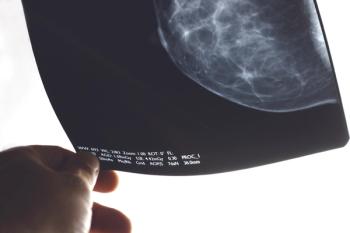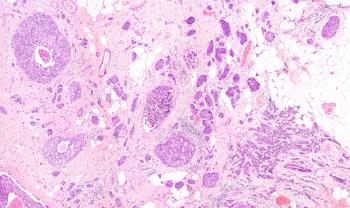
Oncology NEWS International
- Oncology NEWS International Vol 16 No 6
- Volume 16
- Issue 6
MP470 Ups DNA Damage by Platinums
To combat the development of resistance to cytotoxic agents and increase the potency of DNA-damaging agents, compounds are needed that will abrogate the DNA repair pathways.
LOS ANGELESTo combat the development of resistance to cytotoxic agents and increase the potency of DNA-damaging agents, compounds are needed that will abrogate the DNA repair pathways. The oral multitargeted tyrosine kinase inhibitor MP470 may have the ability to do this, improving responses to platinum-based agents, according to several reports from the 2007 American Association for Cancer Research annual meeting.
MP470, developed by SuperGen, Inc, Dublin, California, has potent inhibitory activity against tumor-specific mutant forms of c-Kit, Flt3, and platelet-derived growth factor receptor-α (PDGFR-α), as well as cell-based activity against the receptor tyrosine kinases c-Met and c-Ret. MP470 has a unique ability to suppress Rad51, a DNA repair protein expressed in the majority of cancer cells (see box), said Cory L. Grand, PhD, a research scientist at SuperGen.
In xenograft models of non-small-cell lung cancer (NSCLC), oral administration of MP470 in combination with carboplatin or cisplatin significantly improved the tumor response over that of the platinum agent alone, without increasing toxicity. It also reversed resistance to carboplatin in NSCLC cell lines. In small-cell lung cancer, MP470 showed synergy with topoisomerase inhibitors, Dr. Grand reported (abstract 4028).
Rad51 Suppression
Rajashree Joshi, PhD, director of formulation and preclinical development for SuperGen, showed evidence in animals that MP470 suppresses Rad51 in colon and skin in a dose-dependent fashion, and the effect is sustained post-treatment (abstract 1540). After 28 consecutive daily doses, no target organ toxicity and no serious drug-related adverse events were observed. Tumor regression was achieved in the lung and ovarian mouse xenograft models, she reported.
The DNA damage-enhancing effects of MP470 are not limited to the platinum-based agents; radiation-induced DNA damage and tumor cell death are also perpetuated by MP470 in the context of melanoma skin cancer and glioblastoma. "This opens a new avenue of treatment, of a way of sensitizing patients to radiation therapy and allowing platinum agents to work better," Dr. Joshi said.
Dr. Grand added that reducing the platinum dose required to show a therapeutic response will also lead to reduced toxicity.
In another poster presentation at AACR (abstract 5421), University of Arizona and SuperGen investigators evaluated prostate cancer cell lines and found that MP470 inhibited cell proliferation including c-Met, phosphorylation of tyrosine kinases, and Akt phosphorylation and activity.
MP470 induced apoptosis in a dose-dependent manner and synergized in combination with erlotinib (Tarceva), leading to a significant decrease in tumor growth in a prostate cancer xenograft mouse model, compared with control or either agent alone.
Articles in this issue
over 18 years ago
ACS Launches Major Epidemiology Studyover 18 years ago
Pt Selection Key to Radioembolization of Liver Ca'sover 18 years ago
Million Dollar Gotham Prize Announcedover 18 years ago
Diagnostic Dilemma: GI Diseaseover 18 years ago
Junovan Fails to Win ODAC Nod for Osteosarcoma Treatmentover 18 years ago
Surveillance Colonoscopy Guidelines Not Being Followedover 18 years ago
Removing Stage IV Primary May Cut Mortalityover 18 years ago
Nuclear Export Inhibitors Testing Moving Forwardover 18 years ago
ODAC: orBec Yields No 'Substantial Efficacy' in GI GVHDNewsletter
Stay up to date on recent advances in the multidisciplinary approach to cancer.




































